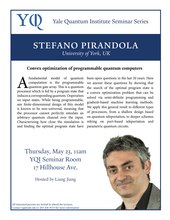Convex optimization of programmable quantum computers
A fundamental model of quantum computation is the programmable quantum gate array. This is a quantum processor which is fed by a program state that induces a corresponding quantum. Ooperation on input states. While being programmable, any finite-dimensional design of this model is known to be non-universal, meaning that the processor cannot perfectly simulate an arbitrary quantum channel over the input. Characterizing how close the simulation is and finding the optimal program state have been open questions in the last 20 years. Here we answer these questions by showing that the search of the optimal program state is a convex optimization problem that can be solved via semi-definite programming and gradient-based machine learning methods. We apply this general result to different types of processors, from a shallow design based on quantum teleportation, to deeper schemes relying on port-based teleportation and parametric quantum circuits.
